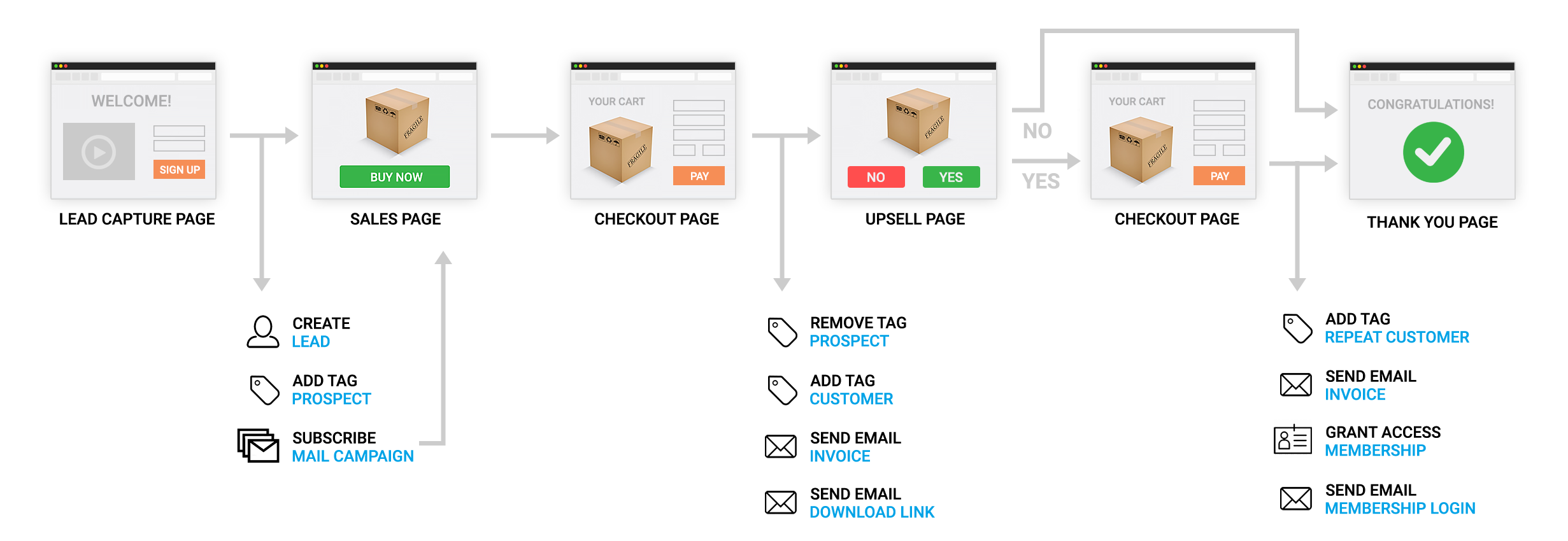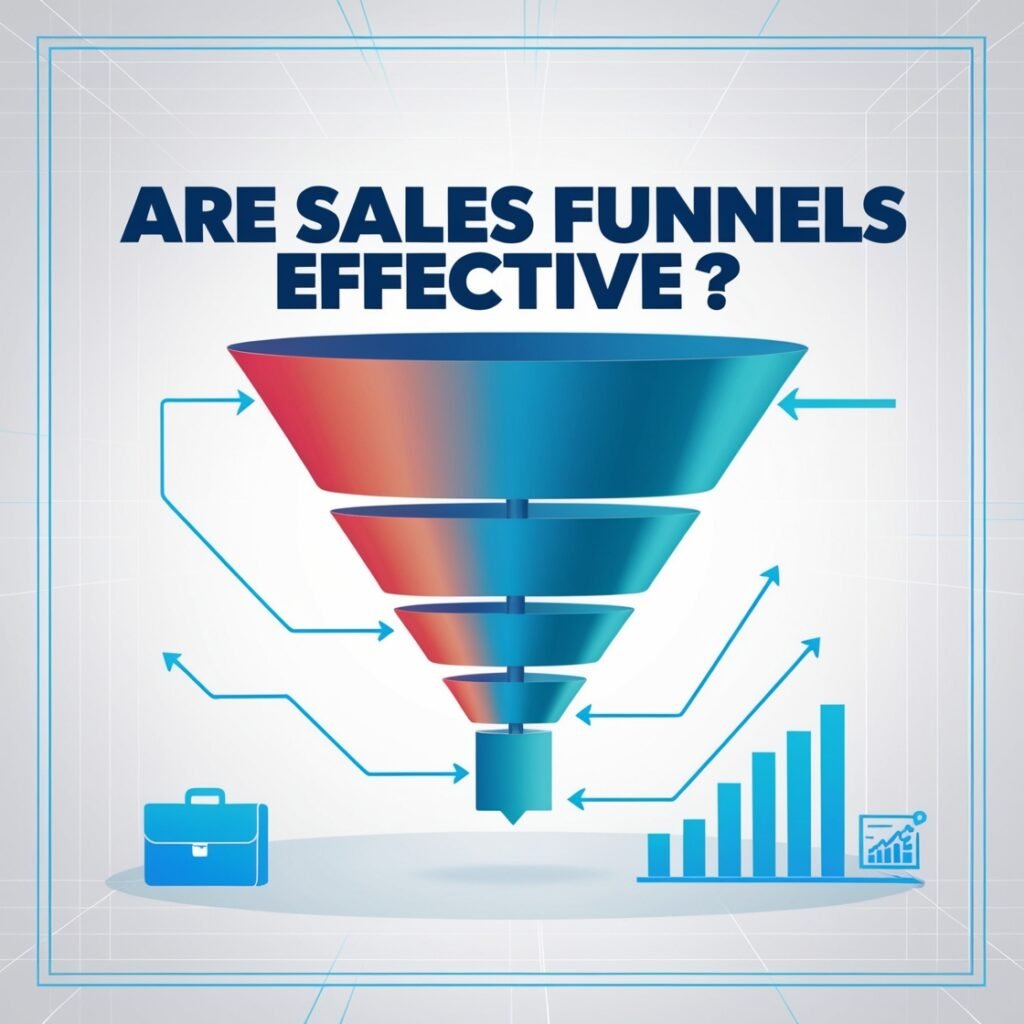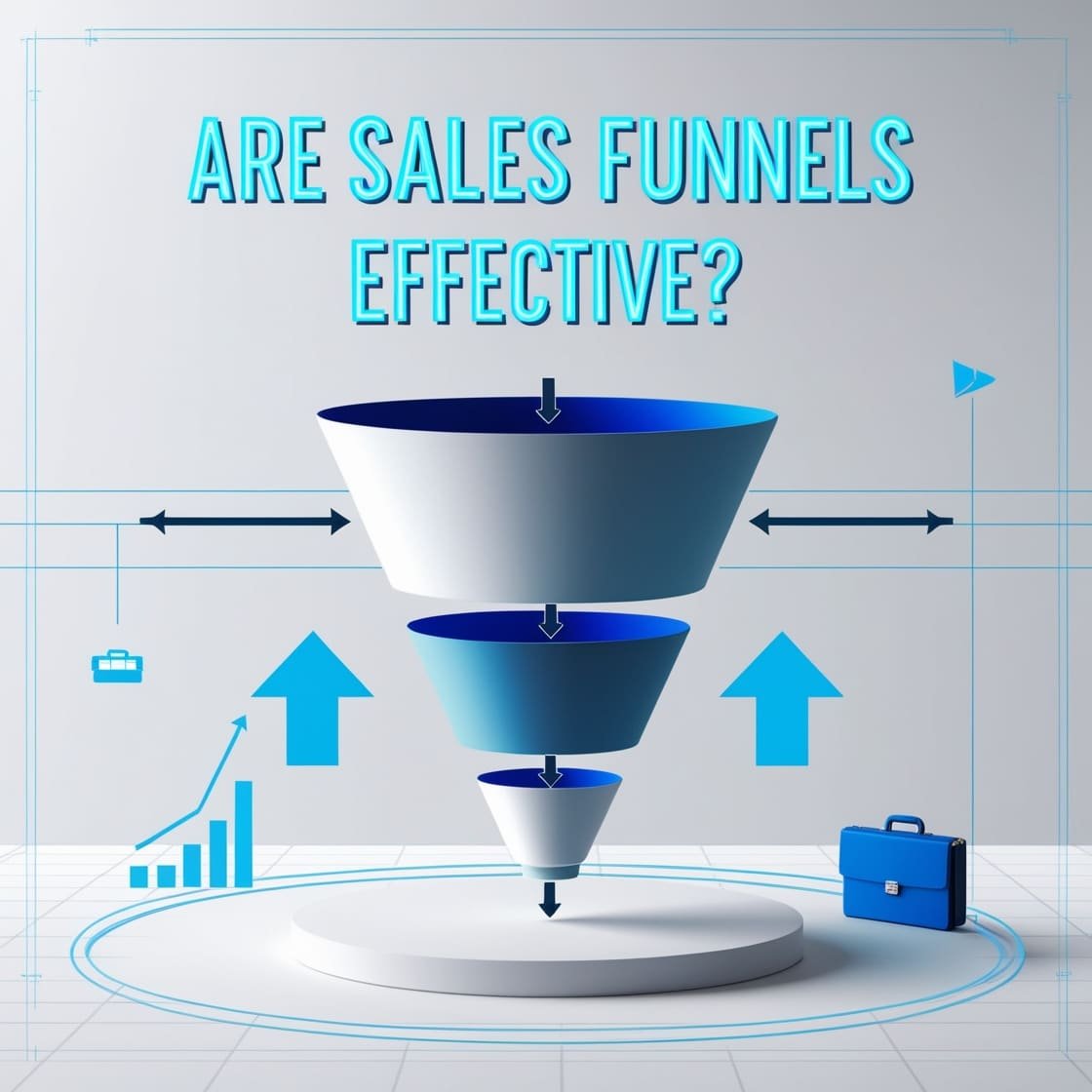Are Sales Funnels Effective? Yes, sales funnels are effective. They guide potential customers through the buying process.
Sales funnels can be powerful tools for businesses. They help convert visitors into buyers by leading them step-by-step. Each stage of the funnel is designed to capture interest, build trust, and motivate action. This method can increase sales and improve customer relationships.
Sales funnels provide a clear path, making it easier to understand customer behavior. Businesses can refine their strategies based on funnel insights. Understanding how sales funnels work can transform your approach to marketing. Dive in to learn more about their benefits and effectiveness.

Credit: imnights.com
Introduction To Sales Funnels
Sales funnels guide potential customers through the buying process. They help convert leads into paying customers. Understanding sales funnels can improve your marketing strategy and sales performance. Let’s dive into the purpose, function, and history of sales funnels.
Purpose And Function
The purpose of a sales funnel is to move prospects through a series of steps. Each step is designed to bring them closer to making a purchase. The function of these steps includes:
- Awareness: Attracting potential customers to your product or service.
- Interest: Engaging them with valuable information and resources.
- Decision: Presenting offers that address their needs.
- Action: Encouraging them to make a purchase.
These steps create a structured path for prospects. They help ensure that potential customers receive the right information at the right time.
History And Evolution
The concept of sales funnels has evolved over time. Early sales funnels were simple and linear. They focused on moving customers from awareness to purchase in a straightforward way. Modern sales funnels are more complex. They incorporate multiple channels and touchpoints. Here’s a brief timeline:
| Period | Development |
|---|---|
| Early 1900s | Basic sales models introduced. Focused on direct sales techniques. |
| 1960s-1980s | Marketing theories expand. Emphasis on consumer behavior. |
| 1990s | Digital marketing emerges. Online sales funnels begin to develop. |
| 2000s-Present | Complex, multi-channel funnels. Integration of social media, email, and content marketing. |
Understanding the history and evolution of sales funnels can help businesses adapt to changing consumer behaviors and technological advancements.
Components Of Sales Funnels
Sales funnels are essential for guiding potential customers through the buying process. They have several stages, each designed to move prospects closer to a purchase. Knowing the components of sales funnels helps create effective marketing strategies.
Awareness Stage
The Awareness Stage is the first step in the sales funnel. Here, potential customers become aware of your product or service. They may find you through:
- Social media posts
- Blog articles
- Search engine results
- Advertisements
The goal is to attract attention and generate interest. Use engaging content to make a strong first impression.
Consideration Stage
In the Consideration Stage, prospects evaluate if your product meets their needs. They compare it with other options. It’s crucial to provide detailed information here. Use:
- Product demos
- Case studies
- Customer testimonials
- In-depth blog posts
Answer common questions and address pain points. This stage builds trust and helps prospects make informed decisions.
Decision Stage
The Decision Stage is where the prospect is ready to buy. They need a final push to convert. Use strategies like:
- Special discounts
- Free trials
- Limited-time offers
- Personalized recommendations
Ensure the buying process is smooth and easy. Provide clear calls-to-action and support. A seamless experience can turn a prospect into a customer.
Benefits Of Using Sales Funnels
Sales funnels are essential tools for businesses aiming to boost their sales. They guide potential customers through a journey, making it easier for them to make a purchase. Let’s explore the benefits of using sales funnels.
Increased Conversion Rates
Sales funnels help in turning visitors into paying customers. They work by providing a structured path, making it simple for users to follow. This structured approach reduces confusion and encourages action.
With a sales funnel, you can:
- Identify potential leads effectively.
- Provide relevant information at each stage.
- Address objections before they arise.
- Guide prospects to the final purchase step.
These steps increase the likelihood of converting visitors into buyers. Ultimately, this boosts your conversion rates significantly.
Improved Customer Retention
Sales funnels do more than just attract new customers. They help in keeping existing ones engaged. By nurturing leads throughout the funnel, you build trust and loyalty.
Here are some ways sales funnels improve customer retention:
- Regular follow-ups with valuable content.
- Personalized offers based on customer behavior.
- Consistent engagement through emails and social media.
- Providing exceptional customer support.
These practices ensure that customers feel valued and are more likely to return. This continuous engagement strengthens your relationship with them, leading to higher retention rates.

Credit: www.close.com
Challenges Of Implementing Sales Funnels
Implementing a sales funnel can boost your business. Yet, it comes with challenges. These hurdles can be overwhelming. Understanding them can help you prepare better.
Technical Complexity
Building a sales funnel involves many steps. It requires technical knowledge. For example, setting up landing pages needs HTML skills. Integrating email marketing tools is also necessary. You might need to use CRM software. All these tools can be confusing. You might need a developer’s help. This adds to your costs.
Here’s a breakdown of common technical tasks:
- Creating and designing landing pages
- Integrating email marketing services
- Setting up CRM systems
- Tracking and analyzing data
Each step needs attention. Missing one can affect the funnel’s performance. So, having technical skills is vital.
Cost Implications
Building a sales funnel isn’t cheap. Various tools and services cost money. You might need to buy:
- Landing page builders
- Email marketing software
- CRM systems
- Analytics tools
Hiring professionals also costs money. Developers, designers, and marketers might be necessary. Their fees can be high. Here’s a simple table showing some typical costs:
| Service | Estimated Cost |
|---|---|
| Landing Page Builder | $30-$300/month |
| Email Marketing Software | $20-$100/month |
| CRM System | $50-$150/month |
| Professional Services | $500-$5000/project |
Costs can add up quickly. Budgeting is crucial. Plan your expenses carefully. This ensures you get the best return on investment.
Case Studies Of Successful Sales Funnels
In this section, we explore successful sales funnels through real-life case studies. These examples show how businesses use sales funnels effectively. By analyzing these cases, you can understand how to implement similar strategies for your own business.
E-commerce Examples
Several e-commerce brands have seen tremendous success with well-structured sales funnels. Let’s dive into a few notable examples:
| Brand | Strategy | Results |
|---|---|---|
| Nike |
|
|
| Amazon |
|
|
Service-based Business Examples
Service-based businesses also benefit from well-crafted sales funnels. Here are some success stories:
| Company | Strategy | Results |
|---|---|---|
| Upwork |
|
|
| HubSpot |
|
|

Tools And Software For Sales Funnels
Sales funnels have become essential for businesses aiming to convert leads into customers. Using the right tools and software can streamline this process, making it more efficient and effective. In this section, we’ll explore some popular platforms and the key features to look for in sales funnel tools.
Popular Platforms
Several platforms offer excellent tools for building and managing sales funnels. Here are some of the most popular ones:
- ClickFunnels: Known for its ease of use and pre-built templates.
- Leadpages: Ideal for creating landing pages and capturing leads.
- Kartra: All-in-one platform with email marketing and membership sites.
- Builderall: Offers a variety of tools including email marketing and website building.
- GetResponse: Includes email marketing, landing pages, and automation features.
Features To Look For
When choosing a tool for your sales funnel, consider the following features:
- Ease of Use: Look for platforms that are user-friendly and require minimal technical skills.
- Integration: Ensure the tool integrates with your existing CRM and email marketing software.
- Templates: Pre-built templates can save time and provide a professional look.
- Analytics: Detailed analytics help you understand your funnel’s performance.
- Automation: Automation features streamline follow-ups and nurture leads.
Choosing the right sales funnel tool can significantly impact your conversion rates. Evaluate these features carefully to find the best fit for your business needs.
Common Misconceptions About Sales Funnels
Many believe sales funnels are the key to business growth. But there are several misconceptions. These misunderstandings can lead to poor decisions. Let’s clear up these common myths.
One-size-fits-all Myth
One common belief is that all sales funnels are the same. This is not true. Each business has unique needs. A sales funnel for a tech company differs from one for a clothing store.
A successful funnel matches your audience. It considers their behavior, preferences, and buying habits. A generic funnel won’t work. Tailoring your funnel is crucial for success.
| Business Type | Unique Funnel Elements |
|---|---|
| Tech Company | Product Demos, Free Trials |
| Clothing Store | Lookbooks, Style Guides |
Instant Results Fallacy
Another myth is expecting quick results. Sales funnels need time to work. They require testing and tweaking.
Expecting instant success can lead to disappointment. Patience is key. Monitor your funnel. Adjust it based on data and feedback.
- Launch your funnel.
- Gather data and feedback.
- Analyze results.
- Make necessary adjustments.
Following these steps ensures your funnel evolves. This increases its effectiveness over time.
Future Of Sales Funnels
The future of sales funnels is promising. With constant advancements, businesses must adapt to stay competitive. Emerging trends and new technologies are shaping how sales funnels function. Let’s explore what lies ahead for sales funnels.
Emerging Trends
Several emerging trends are changing the landscape of sales funnels.
- AI Integration: AI helps in predicting customer behavior. It personalizes the user experience.
- Omnichannel Strategies: Seamless integration across various channels. Ensures a consistent customer journey.
- Interactive Content: Engaging content like quizzes and videos. Keeps users interested and informed.
- Data Privacy: Stricter regulations. Businesses must ensure data protection.
Predictions And Innovations
Future predictions and innovations will further enhance sales funnels.
- Advanced Analytics: Improved data analysis tools. Provides deeper insights into customer behavior.
- Automation: More automation in lead nurturing. Saves time and improves efficiency.
- Enhanced Personalization: Tailored experiences for each user. Increases engagement and conversions.
- Voice Search Optimization: Optimizing for voice search. Adapts to changing search behaviors.
Here’s a quick comparison of traditional vs. future sales funnels:
| Traditional Sales Funnels | Future Sales Funnels |
|---|---|
| Manual processes | Automated workflows |
| Generic content | Personalized content |
| Single-channel approach | Omnichannel approach |
| Limited data insights | Advanced analytics |

Credit: www.linkedin.com
Frequently Asked Questions
What Is A Sales Funnel?
A sales funnel is a step-by-step process guiding potential customers through the buying journey. It helps convert leads into paying customers.
Why Are Sales Funnels Effective?
Sales funnels are effective because they streamline the customer journey. They nurture leads at each stage, improving conversion rates.
How Do Sales Funnels Increase Sales?
Sales funnels increase sales by targeting potential customers with relevant content. This builds trust and encourages purchasing decisions.
What Are The Stages Of A Sales Funnel?
The stages of a sales funnel typically include awareness, interest, decision, and action. Each stage is crucial for conversion.
Conclusion
Sales funnels are highly effective for boosting conversions and sales. They guide customers step-by-step, making the buying process easier. Businesses can see better results and higher profits. Sales funnels also help in understanding customer behavior. This leads to smarter marketing decisions.
In short, implementing sales funnels can improve your business’s success. Try optimizing your funnel today for better outcomes.

